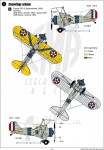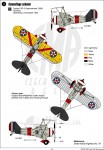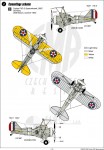1⁄72
Sunday, December 28, 2014 - 04:02 AM UTC
Czech Master Resin web site has new postings, here is one of them:-
The Curtiss F9C Sparrowhawk was a parasite fighter designed to be deployed from and recovered by a large rigid-framed airship, using a special hook/anchor system. It was designed early in 1930, and two prototypes and six production aircraft were delivered with an aim to serve on the USS Akron and Macon.
History
It was a biplane of all metal semi-monocoque fuselage structure and metal tail surfaces, with fabric-covered wings. It was powered by the Wright Whirlwind R-975-E3 radial engine and carried an armament of two 7.62mm Browning machine guns.
Originally intended to provide fighter protection for the dirigibles, the F9C-2s were used primarily to extend the reconnaissance capabilities of the parent airship. The Akron had a complement of three aircraft, while the Macon, which was lost on 12 February 1935, carried four F9C-2s. In order to increase their scouting range while the airship was on operations, some Sparrowhawks were modified by having their landing gear removed and replaced by a fuel tank.
Colour Schemes Included:-
Curtiss F9C Sparrowhawk - 9056 — U.S.S. Macon, November 1933
Curtiss F9C Sparrowhawk - 9057 — U.S.S. Macon, Summer 1933
Curtiss F9C Sparrowhawk - 9058 — U.S.S. Akron, Autumn 1932 to Spring 1933, U.S.S. Macon, Summer 1933
Please remember, when contacting retailers or manufacturers, to mention that you saw their products highlighted here - on AEROSCALE.
History
It was a biplane of all metal semi-monocoque fuselage structure and metal tail surfaces, with fabric-covered wings. It was powered by the Wright Whirlwind R-975-E3 radial engine and carried an armament of two 7.62mm Browning machine guns.
Originally intended to provide fighter protection for the dirigibles, the F9C-2s were used primarily to extend the reconnaissance capabilities of the parent airship. The Akron had a complement of three aircraft, while the Macon, which was lost on 12 February 1935, carried four F9C-2s. In order to increase their scouting range while the airship was on operations, some Sparrowhawks were modified by having their landing gear removed and replaced by a fuel tank.
Colour Schemes Included:-
Curtiss F9C Sparrowhawk - 9056 — U.S.S. Macon, November 1933
Curtiss F9C Sparrowhawk - 9057 — U.S.S. Macon, Summer 1933
Curtiss F9C Sparrowhawk - 9058 — U.S.S. Akron, Autumn 1932 to Spring 1933, U.S.S. Macon, Summer 1933
Please remember, when contacting retailers or manufacturers, to mention that you saw their products highlighted here - on AEROSCALE.
Click Star to Rate
2 readers have rated this story.
THIS STORY HAS BEEN READ 4,279 TIMES.
| Czech Master Resin Reviews | MORE |
| Venom NF.3 by Tim Hatton | |
| Spitfire: Valiant and Victor. by Tim Hatton | |
| Douglas DC-2 by Is a secret | of 1 ratings, 100% found this helpful | |
| AVRO Shackleton by Richard Tonge | |
| DH Venom NF.2/2A Nightfighter by Tim Hatton | of 1 ratings, 100% found this helpful | |
| Horten H IVb Glider by Tim Hatton | of 1 ratings, 100% found this helpful | |
| Bristol Sycamore by Tim Hatton | of 2 ratings, 100% found this helpful | |
| de Havilland Vampire FB.31 by Tim Hatton | |
| de Havilland Sea Venom by Tim Hatton | of 1 ratings, 100% found this helpful | |
| de Havilland Vampire F.30 by Tim Hatton | of 1 ratings, 100% found this helpful | |
| SNCASE SE 535 Mistral by Tim Hatton | |
| Schleicher ASH25 by Tim Hatton | |
| Supermarine Scimitar F.1 Early by Tim Hatton | |
| Boeing Model 40C by Tim Hatton | of 5 ratings, 100% found this helpful | |
| Schleicher ASH25M/ASH25Mi by Tim Hatton | |











Comments